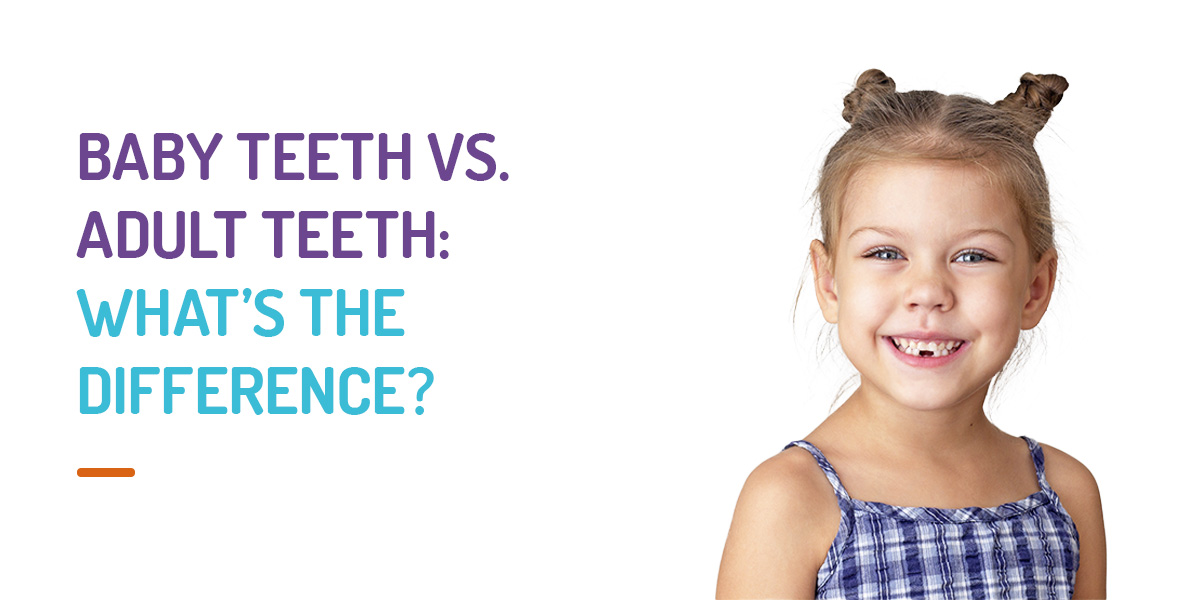We all start out with a set of baby teeth, which eventually fall out, only to be replaced by our adult teeth. From childhood to adulthood, our teeth help us to chew, talk and smile — but what is the difference between permanent teeth and baby teeth? There are plenty of ways to tell them apart. Explore how to tell the difference between a baby tooth and a permanent tooth, from their size to their function.
Call to Schedule A Dental Appointment
Quantity
One of the easiest ways to differentiate between the adult and baby teeth is how many there are. Children have 20 baby teeth, and they typically start to erupt at around 6 months old. These include four central incisors, four lateral incisors and four canine teeth, as well as eight molars. Adults have 32 permanent teeth.
Size and Shape
Are baby teeth smaller than permanent teeth? Generally, yes! Starting with the incisors, baby teeth have flatter biting edges and are typically smaller and more square-shaped. Adult incisors have more rounded biting edges and also erupt with three little ridges on the biting edge. These ridges are called mamelons. Mamelons make it easier for the tooth to break through the gums as it erupt. As for the molars, adult molars tend to have deeper grooves and valleys along the chewing surface. Baby teeth have less notable grooves that are much more shallow.
Strength
Permanent teeth are tougher and more durable than baby teeth. This is largely due to the fact that permanent teeth have a thicker layer of enamel, which makes them more resistant to decay and cavities. Because baby teeth are softer and have thinner enamel, they are more susceptible to breakdown from contact with acids and bacteria.
Color
Baby teeth are typically whiter than permanent teeth. This may seem noticeable if your child has adult teeth erupting next to baby teeth, but this coloring will look natural once all the baby teeth have fallen out.
Purpose
Finally, baby teeth and adult teeth have very different purposes. While they perform the same day-to-day functions of chewing your food and allowing you to vocalize clearly, they have more subtle roles to play as well. One common question people wonder is whether or not baby teeth affect permanent teeth. The answer is a resounding yes. Baby teeth essentially act as a placeholder, maintaining the correct spacing in your jaw so that your adult teeth will have room to erupt into the correct positions. Once your adult teeth have moved into position below the gumline and are ready to erupt, the roots of the baby teeth will gradually disintegrate, and the tooth will eventually fall out.
This is why the early loss of a baby tooth can cause dental placement issues down the road. Sometimes, an injury or impact can knock out a tooth before it’s ready to fall out. In this case, your dentist may put a dental space maintainer in place to protect that spot until the adult tooth grows in.
Permanent teeth, of course, have their own important purpose. These stronger, harder, bigger teeth keep your mouth functioning properly. With dedicated cleaning and care, they should last you the rest of your life.
Signs Your Child’s Adult Teeth Are Growing In
While the exact timeline will vary from child to child, you can generally expect your child’s adult teeth to emerge around the following ages:
- Upper central incisors: 8 to 12 months
- Lower central incisors: 6 to 10 months
- Upper lateral incisors: 9 to 13 months
- Lower lateral incisors: 10 to 16 months
- Upper canine: 16 to 22 months
- Lower canine: 17 to 23 months
- First upper molar: 13 to 19 months
- First lower molar: 14 to 18 months
- Second upper molar: 25 to 33 months
- Second lower molar: 23 to 31 months
As your child’s teeth emerge, it’s common for them to experience a variety of symptoms, like:
- Swelling
- Jaw pain
- Headaches
If your child becomes uncomfortable due to these symptoms, you can try remedies such as gently massaging their gums with a damp toothbrush.
How to Care for Your Child’s Primary vs. Permanent Teeth
Keeping your child’s teeth healthy is essential for any stage of development. When your child is a baby, and before their teeth emerge, you can maintain their oral health by running a clean, damp washcloth over their gums to clear harmful bacteria. Once their baby teeth appear, you can start brushing them with an infant toothbrush and water. By age 6, your child should be able to brush their teeth with toothpaste, but make sure you still supervise the cleaning process.
Once your child’s adult teeth begin emerging, you can teach them how to care for their new teeth while ensuring their baby teeth remain healthy. Some ways you can assist your child include helping them brush and floss and making sure your child has a healthy diet full of vitamins and minerals to keep their teeth strong.
One of the best ways to care for your child’s baby and adult teeth is by visiting a pediatric dental office regularly. At Fox Kids Dentistry & Orthodontics, we recommend having your child visit us around their first birthday so that we can help you and your child create healthy dental habits for life.
Schedule a Dental Cleaning or Checkup at Fox Kids Dentistry & Orthodontics Today
Want to take the next step in keeping your teeth healthy and your smile bright? Reach out to Fox Kids Dentistry & Orthodontics today to schedule an appointment.

